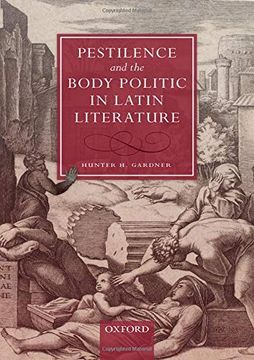Compartir
Pestilence and the Body Politic in Latin Literature (en Inglés)
Hunter H. Gardner (Autor)
·
Oxford University Press
· Tapa Dura
Pestilence and the Body Politic in Latin Literature (en Inglés) - Hunter H. Gardner
160,34 €
168,77 €
Ahorras: 8,44 €
Elige la lista en la que quieres agregar tu producto o crea una nueva lista
✓ Producto agregado correctamente a la lista de deseos.
Ir a Mis Listas
Origen: Estados Unidos
(Costos de importación incluídos en el precio)
Se enviará desde nuestra bodega entre el
Miércoles 24 de Julio y el
Miércoles 07 de Agosto.
Lo recibirás en cualquier lugar de España entre 1 y 5 días hábiles luego del envío.
Reseña del libro "Pestilence and the Body Politic in Latin Literature (en Inglés)"
Scientists, journalists, novelists, and filmmakers continue to generate narratives of contagious disease, stories shaped by a tradition of disease discourse that extends to early Greco-Roman literature. Lucretius, Vergil, and Ovid developed important conventions of the western plague narrative as a response to the breakdown of the Roman res publica in the mid-first century CE and the reconstitution of stabilized government under the Augustan Principate (31 BCE-14 CE): relying on the metaphoric relationship between the human body and the body politic, these authors used largely fictive representations of epidemic disease to address the collapse of the social order and suggest remedies for its recovery. Theorists such as Susan Sontag and Rene Girard have observed how the rhetoric of disease frequently signals social, psychological, or political pathologies, but their observations have rarely been applied to Latin literary practices. Pestilence and the Body Politic in Latin Literature explores how the origins and spread of outbreaks described by Roman writers enact a drama in which the concerns of the individual must be weighed against those of the collective, staged in an environment signalling both reversion to a pre-historic Golden Age and the devastation characteristic of a post-apocalyptic landscape. Such innovations in Latin literature have impacted representations as diverse as Carlo Coppola's paintings of a seventeenth-century outbreak of bubonic plague in Naples and Margaret Atwood's Maddaddam Trilogy. Understanding why Latin writers developed these tropes for articulating contagious disease and imbuing it with meaning for the collapse of the Roman body politic allows us to clarify what more recent disease discourses mean both for their creators and for the populations they afflict in contemporary media.
- 0% (0)
- 0% (0)
- 0% (0)
- 0% (0)
- 0% (0)
Todos los libros de nuestro catálogo son Originales.
El libro está escrito en Inglés.
La encuadernación de esta edición es Tapa Dura.
✓ Producto agregado correctamente al carro, Ir a Pagar.

